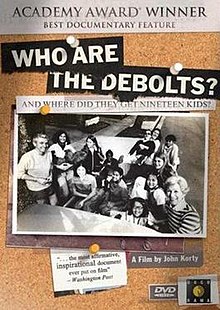Who Are the DeBolts? And Where Did They Get Nineteen Kids?
| Who Are the DeBolts? And Where Did They Get Nineteen Kids? | |
|---|---|
 |
|
| Directed by | John Korty |
| Produced by | John Korty |
| Written by | Janet Peoples |
| Narrated by | Henry Winkler |
| Cinematography | Jon Else |
| Edited by | David Webb Peoples |
|
Release date
|
December 5, 1977 |
|
Running time
|
72 minutes |
| Country | United States |
| Language | English |
Who Are the DeBolts? And Where Did They Get Nineteen Kids? is a 1977 documentary film about Dorothy and Bob DeBolt, an American couple who have adopted 14 children, some of whom are severely disabled war orphans (in addition to raising Dorothy's five biological children and Bob's biological daughter). VHS and DVD releases use the shortened title Who Are the DeBolts?
The film was narrated by Henry Winkler, who also served as executive producer, and won an Academy Award for Best Feature-length Documentary in 1978, as well as the Directors Guild of America Award and the Humanitas Award for producer and director John Korty in 1979. A 50-minute version of the film shown on ABC in December, 1978, earned a 1979 Emmy Award for Outstanding Individual Achievement - Informational Program and an Emmy nomination for Outstanding Informational Program for Winkler, Korty, and producers Warren Lockhart and Dan McCann. A sequel, Steppin' Out: The DeBolts Grow Up, was made in 1980 with Kris Kristofferson as host and narrator. The DVD edition typically includes the 46-minute sequel as a featurette. The family was also the subject of a book, 19 Steps Up The Mountain: The Story of The DeBolt Family, by Joseph P. Blank.
The film begins with Mr. and Mrs. DeBolt traveling from their home in California to New York, where they will adopt their 19th child, a blind and physically disabled teen named "J.R." The adoption process for J.R., his integration into the family, and his struggle to develop sufficient physical strength to climb the staircase inside the family home are used as a unifying device for telling the story of how the DeBolts became involved in the adoption of "special needs" children and showing how the family approaches the challenges of raising their unusual family.
...
Wikipedia
